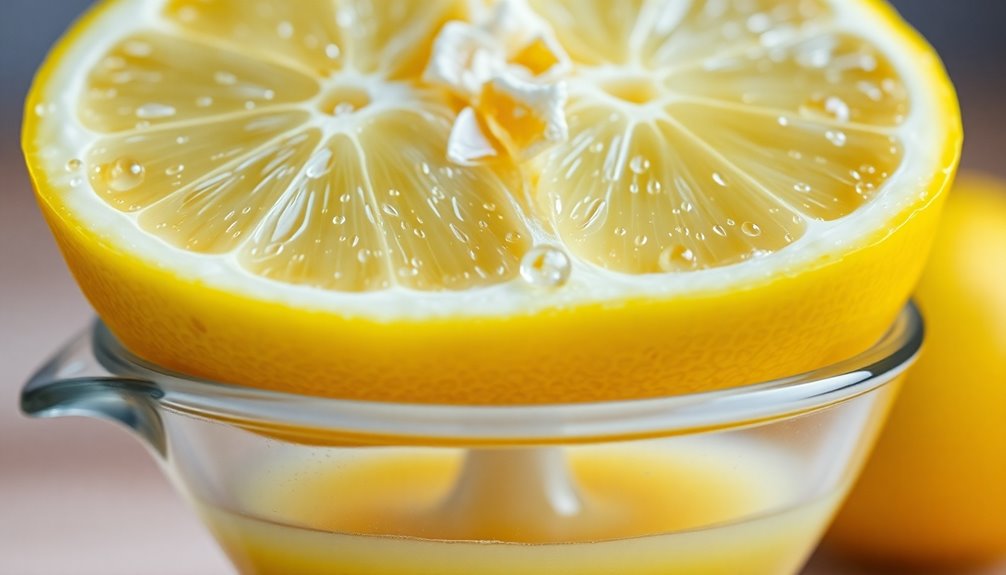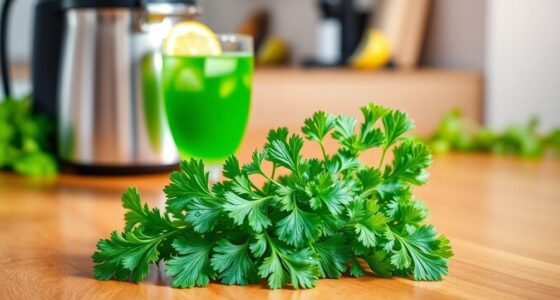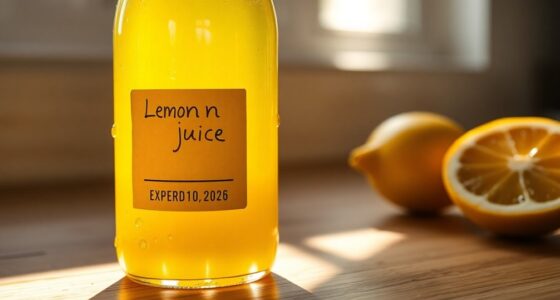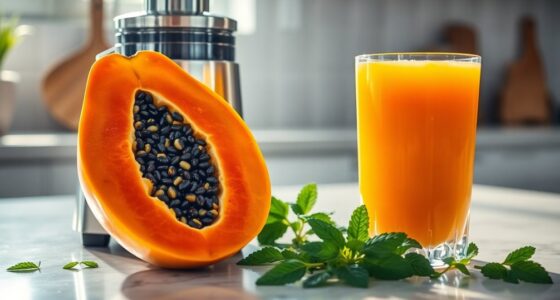A medium lemon gives you about 2 to 3 tablespoons of juice, while a large lemon produces around 4 tablespoons or ¼ cup. If you want to maximize juice yield, try rolling it on a hard surface or microwaving it for 10 to 20 seconds before squeezing. Both methods can help you get even more juice. Plus, there's more to know about using lemons effectively in your recipes, so keep exploring!
Key Takeaways
- A medium lemon yields about 2 to 3 tablespoons of juice.
- A large lemon produces approximately 4 tablespoons or ¼ cup of juice.
- Half a medium lemon yields about 1½ tablespoons of juice.
- Juice yield varies based on the lemon's size and ripeness.
- Warmer months typically produce juicier lemons than winter harvests.
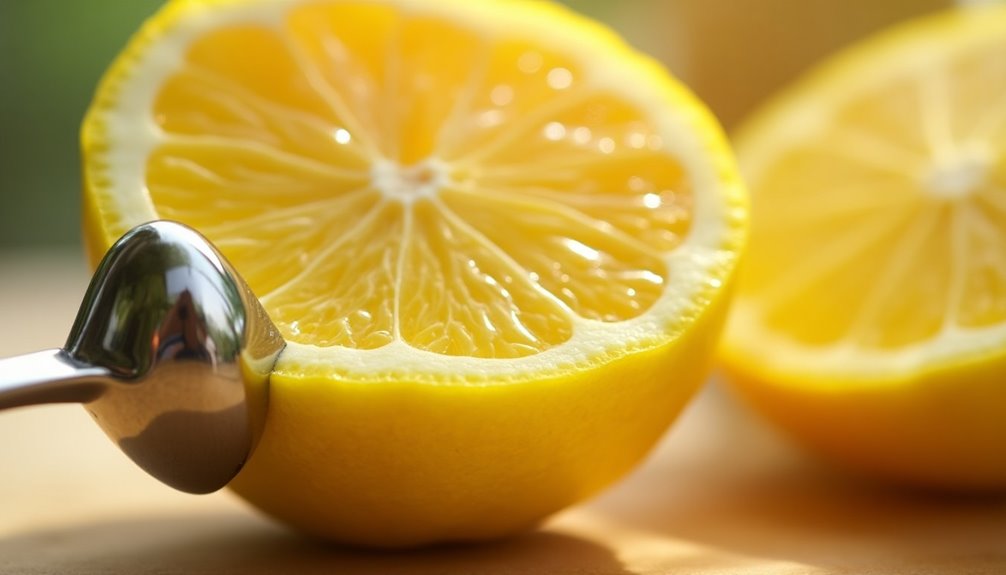
Have you ever wondered how much juice you can actually get from a lemon? It's a common question, especially when you're in the middle of a recipe that calls for lemon juice. The truth is, the juice yield from a lemon can vary quite a bit depending on the size and ripeness. Generally, a medium lemon gives you about 2 to 3 tablespoons of juice, while a large lemon can produce approximately 4 tablespoons, or a quarter cup.
If you find yourself in need of ½ cup of lemon juice for a recipe, you'll typically need around 3 medium lemons or 2 large lemons to get that amount. The season can also affect how much juice you get. Lemons harvested in the warmer months tend to be juicier than those picked during winter. So, if you're planning to make a refreshing lemonade or a zesty sauce, it might be worth considering the time of year.
If you want to maximize your juice yield, there are a few tricks you can try. For instance, rolling a lemon on a hard surface before cutting it can help break down some of the cells inside, releasing more juice. Another handy method is microwaving the lemon for about 10 to 20 seconds. This simple step can increase your juice yield by approximately 1.5 times. Just be careful not to overheat it!
After microwaving, you'll find that squeezing the lemon yields a lot more juice, making it easier to get the amount you need without much hassle. If you're ever left with half a lemon, you can expect about 1½ tablespoons of juice from a medium one and around 2 tablespoons from a large one, perfect for a quick dressing or a splash of flavor in your dishes.
When you zest a lemon, you're not only adding vibrant flavor but also enhancing your culinary creations. The zest contains essential oils that contribute to the lemon's unique aroma and taste, which can elevate your recipes even further. It's a great way to make the most of your lemon, especially if you're already squeezing it for juice.
Frequently Asked Questions
How Much Juice Does 1/2 Lemon Make?
When you’re squeezing half a lemon, you can expect to get about 1½ tablespoons of juice from a medium-sized lemon. If you’re wondering how much juice in a lemon you can extract, keep in mind that the size and ripeness of the lemon can affect the yield. Larger lemons can provide up to 3 tablespoons of juice, while smaller ones may give you closer to 1 tablespoon. To maximize the amount of juice, roll the lemon on a countertop before slicing it, as this helps break down the membranes inside.
If you're using a large lemon, that amount increases to roughly 2 tablespoons.
Keep in mind that smaller lemons, like the Eureka variety, might only yield about 1 tablespoon.
It's a good idea to have a few extra lemons handy, just in case you need more juice for your recipe.
How Much Concentrated Lemon Juice Equals 1/2 Lemon?
To substitute concentrated lemon juice for half a lemon, you'll want about 1 tablespoon of concentrated juice.
This amount roughly matches the juice yield from half a medium lemon.
Keep in mind that the size and ripeness of the lemon can affect the juice yield, so you may need to adjust based on your specific lemon.
Also, remember that concentrated juice might taste different from fresh juice, so taste as you go!
How Much Real Lemon Equals the Juice of One Lemon?
Picture a fresh lemon, its vibrant yellow skin glistening in the sunlight.
When you squeeze it, you're likely to get about 2-3 tablespoons of juice from a medium lemon. If you're using a large one, expect up to 4 tablespoons.
So, if you’re aiming for the juice of one lemon, remember that you’ll need around 2-3 tablespoons of real lemon juice for your recipes. If you’re unsure about how much juice in a lemon is typically yielded, it’s helpful to know that an average lemon contains about 2-4 tablespoons of juice. This means that if a recipe calls for the juice of one lemon, it’s usually safe to estimate on the higher end for maximum flavor. Always taste your dish as you go, as the acidity can vary based on the freshness of the lemon.
Don't forget to have a few extras on hand!
How Many Teaspoons Are in 2 Lemons?
To find out how many teaspoons are in 2 lemons, it really depends on their size.
If you're using medium lemons, you'll get about 18 teaspoons from both. If they're large, you could squeeze out around 24 teaspoons.
On the other hand, smaller lemons will yield about 12 teaspoons.
Conclusion
In the end, squeezing a lemon is like unlocking a treasure chest of flavor. With just one lemon, you can extract about 2 to 3 tablespoons of juice—enough to brighten up your water, elevate a dish, or create a refreshing cocktail. So, the next time you pick up a lemon, remember it's not just a fruit; it's a burst of sunshine waiting to enhance your culinary adventures. Embrace the zest, and let the juice flow!
Cindy thoroughly researches juicing trends, techniques, and recipes to provide readers with practical advice and inspiration. Her writing style is accessible, engaging, and designed to make complex concepts easy to understand. Cindy’s dedication to promoting the advantages of juicing shines through her work, empowering readers to make positive changes in their lives through the simple act of juicing.

